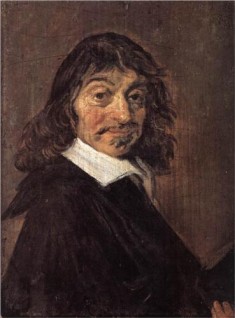| René Descartes | |
|---|---|
 |
|
| Philosopher | |
| Specialty | Modern Western Philosophy |
| Born | Mar. 31, 1596 La Haye en Touraine, Kingdom of France |
| Died | Feb. 11, 1650 (at age 53) Stockholm, Swedish Empire |
| Nationality | French |
René Descartes has been called “The Father of Modern Philosophy,” as his work was very influential on Western thinking and philosophy. In addition to his achievements in the discipline of philosophy, Descartes was a great figure in the field of mathematics. Today, he influences many in academic circles in both fields of critical thinking and applied mathematics.
Early Years of René Descartes
Rene Descartes was born in La Haye en Touraine, France, on March 31, 1596. As he grew older, he attended the Jesuit Collège Royal Henry-Le-Grand where he formally commenced his study of math and physics. During this time, he was introduced to the work of Galileo, which was quite influential on him.
After he completed his initial studies, he enrolled at the University of Poitiers where he studied law. This is not really what Descartes wanted to do with his life and he was only enrolled in a law program because it is what his father wanted.
Descartes Goes Traveling
Descartes grew bored with the studies he was not interested in. He was soon overtaken by wanderlust, and he started traveling throughout the land. He went on to chronicle his travels in his landmark work Discourse on the Method. Based on his musings, it seemed that Descartes learned most about life not from his academic studies, but from his travels around the world.
Descartes eventually joined the Army of Breda as being an officer was one of his lifelong ambitions. He studied military engineering during this time period. While serving in the army, a very strange thing happened during the early part of November 1619. Descartes had locked himself in a warm room to escape the cold.
During this time, he was overcome with strange visions that forever changed his outlook on life. He felt a divine spirit visited him and, later in life, he said this divine spirit helped him craft new methods of analytical geometry and critical philosophy.
Whether or not Rene Descartes was divinely inspired remains a matter of conjecture, but we do know his eventual works were revolutionary. Neither mathematics nor philosophy would be the same after his new discoveries were made.
The Philosophy of Rene Descartes
 Descartes, like all great philosophers, believed that reason was the core to understanding the natural world and the natural sciences. The particular school of thought that was founded by Descartes was called Cartesianism and it is rooted in the theory that thinking and reasoning must always be the focus of any serious attempt to come to a true conclusion or realization.
Descartes, like all great philosophers, believed that reason was the core to understanding the natural world and the natural sciences. The particular school of thought that was founded by Descartes was called Cartesianism and it is rooted in the theory that thinking and reasoning must always be the focus of any serious attempt to come to a true conclusion or realization.
In Cartesianism, there is the theory that the world is comprised of three areas of existence. Within these three areas would be the mind, the body, and the realm God inhabits. The notion the mind is separate from the body is an interesting one. This notion is taken a few steps further when a discussion of the senses is conducted. Essentially, in this philosophy, sensations can be deemed a distortion of reality and should never be confused with actual reality at all.
Major Written Works of Descartes
The Discourse on the Method (1637) is the most famous of all the works written by Descartes. In addition to being a philosophical text, it also offers quite a bit of autobiographical information about the philosopher. The work centers on the sciences and also infuses a healthy dose of skepticism. The methods Descartes revealed in this work helped lay the foundation for the direction philosophy and thinking took in future generations.
Principles of Philosophy (1644), The World, (1633), and Meditations on First Philosophy (1644) were his other major works. Geometry (1637) was his major work of mathematics. He wrote scores of other works and letters as well, although they did not reach the level of acclaim as The Discourse on the Method and Geometry.
Death and Legacy of Descartes
Descartes lived a very active life and was known for his travels and philosophical works. He eventually went to Stockholm, Sweden, in 1650 to act as the tutor to Queen Christina of Sweden. He remained a guest at the house of the French Ambassador during this time. Despite the rather opulent surroundings, the conditions led to Descartes contracting pneumonia. He passed away on February 11, 1650.